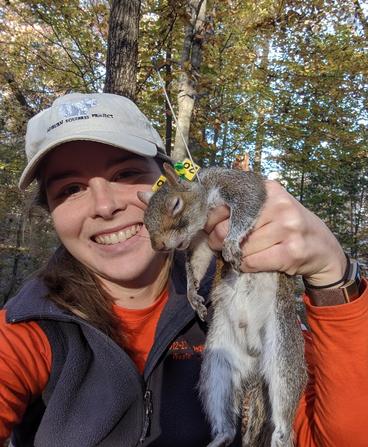
The Midwest Climate Adaptation Science Center is excited to welcome Sarah Ramirez as the postdoctoral researcher leading a synthesis project based at the University of Wisconsin-Madison. This is the second MW CASC synthesis research project to be launched. It will focus on incorporating climate resilience into management of fish and wildlife within the context of a changing and variable climate. Specifically, Sarah will lead research on phenotypic variation as it relates to climate adaptation in fish and wildlife, including identifying climate-resilient phenotypes, and building a conceptual framework for incorporating adaptive capacity into fish and wildlife management.
Sarah is originally from Columbia, South Carolina. She earned her bachelor's degree in Wildlife and Fisheries Biology at Clemson University and then moved to Auburn University in Alabama, where she completed her master's in Wildlife Sciences and PhD in Biology. Her research focused on hoarding behavior and adaptations of eastern gray squirrels, using a combination of field studies and theoretical simulations. She shared that her favorite dissertation project was the citizen science project she developed, called the Auburn Squirrel Project. "It resulted in over 750 people around the eastern United States reporting observations of over 4500 squirrels to look at geographic patterns in hoarding behavior," Sarah said, "I really enjoyed interacting with the volunteers for my project and hearing stories about their backyard squirrels."
For the past eight years, Sarah has focused on the effects of changing environmental conditions on different small mammal behaviors. Part of the reason she was drawn to this position was her interest in how the costs and benefits of a behavior may differ for a population depending on where they are located and the climate they are adapted to. As climate change causes environmental conditions to change, she is interested in what impact that will have on wildlife that have very specific adaptations to either colder climates or less variable environmental patterns.
Sarah described the synthesis project as, "broadly focusing on the role of phenotypic plasticity in the adaptive capacity of fish and wildlife species in the Midwest. If a species exhibits phenotypic plasticity among individuals, or the ability to adjust their behaviors, physiology, or reproduction in response to changes in environmental conditions, that species may have an inherent ability to persist as climate change progresses. However, levels of phenotypic plasticity may differ between populations of the same species, so we hope to be able determine the importance of considering the plasticity present within a population when thinking about managing that population in the face of climate change." She is striving to ensure that project outcomes are helpful and useable for managers.
Outside of work, Sarah enjoys riding her horse, Dan, and hanging out with her husband, their dog, and their two cats.
